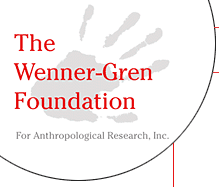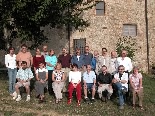|
|
|
|
|
|||||||
|
SPONSORED BY
28 - 30 August 2004 Convento dell'Osservanza, Radicondoli (Siena), Italy "Fission-Fusion Societies and Cognitive Evolution"
|
||||||||||
|
A
Workshop by invitation
The workshop was aimed at evaluating whether special features associated with flexible social organization, such as fission-fusion societies, have been a major factor in the evolution of advanced cognitive abilities. Such social flexibility is due to community members having the option of associating in subgroups of different size and composition. In the extreme cases, individuals belonging to the same community are rarely all together, but spend most of the time in temporary subgroups that frequently merge (fusion) and split (fission) again with different composition. Although such flexible social organization is rare among primates, it is characteristic of human societies and the closely related chimpanzees and bonobos. The workshop was held immediately following the 20th Congress of the International Primatological Society (Turin, Italy, 23-28 August 2004) in which we held a symposium on "Fission-Fusion Societies". At the symposium, speakers gave state-of-the-art reviews of key aspects of the fission-fusion organization of various primate and non-primate species contrasting them with species living in more cohesive groups. This comparative perspective set the stage for examining whether fission-fusion societies are special with respect to a number of features. The post-symposium workshop provided the ideal situation for a well-structured follow-up discussion forum on various topics raised at the symposium among 20 highly qualified scientists. The format of the workshop was a combination of a roundtable session, ad-hoc small-group discussion sessions, and plenary reporting sessions. We started with a roundtable discussion on definitions of fission-fusion social systems and the scope of using such terminology. We then formed four small groups of 4-6 individuals each. Each group focused on a critical topic and integrated the relevant issues raised during the symposium. The composition of the small groups capitalized on the participants' variety of expertise and encouraged a broad comparative perspective. Each small discussion group focused on one of the following topics contrasting flexible social systems with less fluid systems: - Socio-ecological causes and consequences - The role of communication in the regulation of social relationships - Cognitive implications at the proximate level - Cognitive evolution associated with fission-fusion patterns. The plenary sessions allowed all participants to exchange views on the topics previously discussed during the small-group discussion sessions. A new round of small-group sessions incorporated the various points made during the plenary sessions, which were then summarized in working documents and presented in a final plenary session. One main outcome of the workshop was the consensus for a broader use of the term 'fission-fusion', not just as a label of a particular social organization, but as a characteristic of social organization that varies along a complex continuum from highly cohesive to highly fluid with stable or flexible membership. We believe that the workshop was instrumental in initiating new research programs for detailed investigations on the degree of spatial and social fluidity in a variety of species. A second main outcome was the emphasis on the importance of research in the regulation of social relationships, which can be particularly challenging in highly fluid groups and impose specific cognitive demands. Apart from identifying the need for research programs on the proximate cognitive mechanisms to cope with such challenges, conference participants agreed that the study of the differences and similarities across species displaying different degrees of flexible social organizations can elucidate the critical factors underlying the evolutionary processes at the basis of fission-fusion patterns, including those involving our own ancestors. A third main outcome was the realization that a broad perspective is needed for comparative tests of the relative complexity and cognitive requirements of the strategies used to deal with the challenges of high degree of spatial and social fluidity. In this respect, the conference offered a first opportunity to incorporate complementary knowledge from primate and non-primate species for which the similarities in social organization cannot be attributed to common ancestry. The conference specifically contributed to the current debate about potential cognitive differences between monkeys and apes, which is central to theories of human cognitive evolution. The workshop was a great success. Everything ran smoothly, thanks to the great local organization. Several participants reported that it was the most successful conference of this type they ever attended. The work stemming from the small-group discussion sessions was so productive that it was published as an article in Current Anthropology.
|
||||||||||
|
||||||||||
|
|
||||||||||
|
Convent | Convent Events | Corbaiola Ethological Park | CSE & Ethoikos |
||||||||||
|
©2002-2008 all rights reserved |
last updated on: 21 November 2008 |
|||||||||




